
Mediation of Estate Disputes
What is Mediation? Mediation is an alternative dispute resolution process, when opposing parties formally engage an independent, neutral mediator, who assists the parties to reach an agreement. The role of mediation is to promote a faster and more cost effective resolution. Mediation is a process that can take different forms including judicial settlement conferences, court-annexed

Challenging a Will on the Grounds of Suspicious Circumstances
What Constitutes Suspicious Circumstances? Suspicious circumstances are circumstances surrounding the preparation or execution of a Will which give rise to suspicion. The suspicious circumstances can involve circumstances surrounding the preparation of the will and circumstances surrounding the execution of the Will. A will made under suspicious circumstances may be invalid and may be challenged on that

What is Undue Influence on a Will-Maker
Defining What Is Undue Influence in Probate Law Undue influence is where a person makes a Will that is the product of coercion – that is – a will that is not the will that the testator would have made absent the coercion. In other words, a Will made against the testator’s free will. The

How to Make a Family Provision Claim in NSW
Overview of Family Provision Claims in NSW In New South Wales, the estate of a deceased person can be left to anyone they choose. This is referred to as testamentary freedom. In some individual circumstances, the law can override the will made by the deceased person by altering the distribution of the deceased estate. This
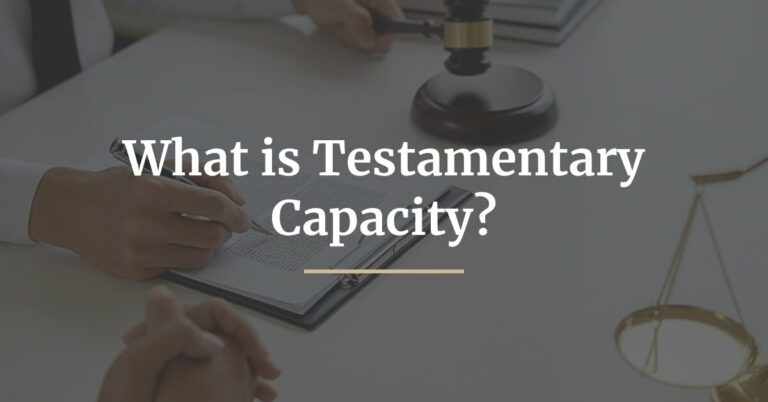
What is Testamentary Capacity?
Testamentary Capacity is a term used to describe the mental and cognitive ability that a person who makes a will (known as a ‘will-maker’ or ‘testator’) must have at the time of making their will, in order for the will to be valid. Defining Testamentary Capacity in NSW Testamentary capacity requires a will-maker to be

Challenge a Will on the Grounds of Undue Influence
A will that is found to be the product of undue influence will be invalid. What constitutes undue influence depends on the circumstances, but is usually used to describe illegitimate coercion. The coercion does not require physical violence but does require the testator to be prevented from exercising a free will. Coercion differs from other
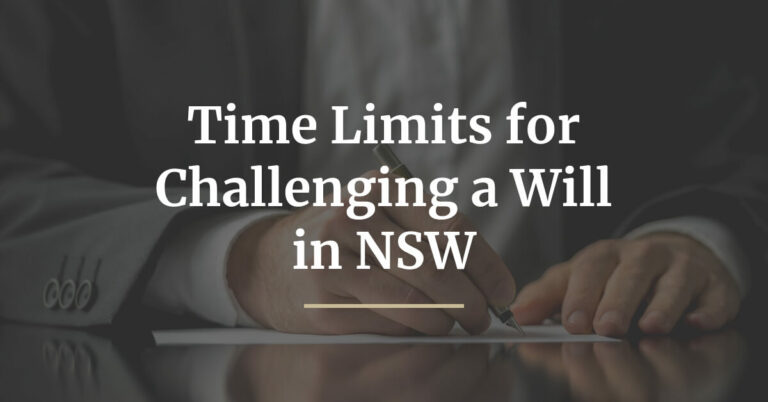
Time Limits for Challenging a Will in NSW
The time limit for challenging a will in NSW depends on the facts and circumstances of each case. Whilst there is no statutory limitation period for challenging a will as there is for contesting a will (also known as a family provision claim), it is important to seek legal advice as soon as possible to

Contesting an Executor of a Will
The person named as executor in a deceased’s last valid will has the right to apply for probate and to administer the deceased’s estate. If the will establishes testamentary trusts and names a trustee (who may or may not also be the executor) then that person has the right to act as trustee of those
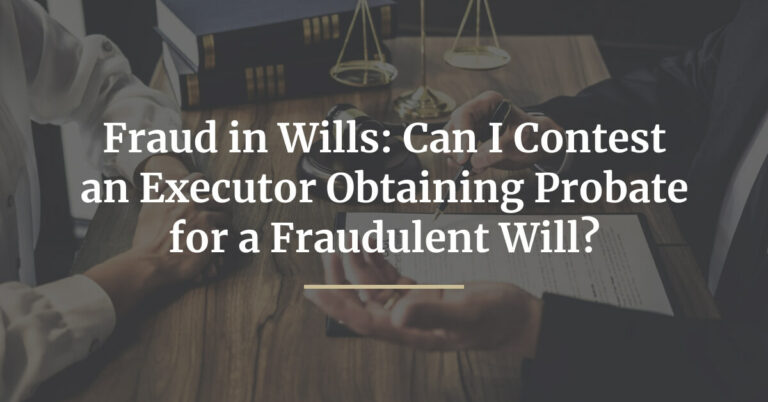
Fraud in Wills: Can I Contest an Executor Obtaining Probate for a Fraudulent Will?
Wills created as a result of fraud: What it Means A will created under fraud is a Will that is the product of false or misleading facts or circumstances that mislead the will-maker (known as the ‘testator’). Where a court finds a Will to be the product of fraud or forgery, the court will refuse

Challenging the Validity of a Will
To challenge a will means to take issue regarding the validity of will. The common grounds upon which a will may be challenged include undue influence, fraud, or where it has been prepared under suspicious circumstances. The facts and circumstances of each case determine whether a last will and testament can be challenged and on
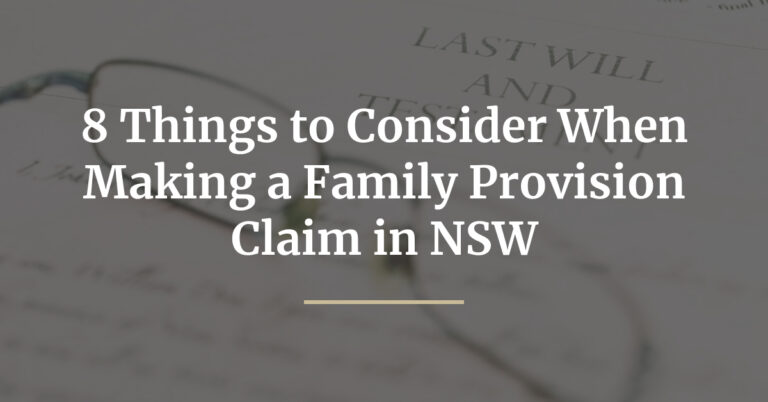
8 Things to Consider When Making a Family Provision Claim in NSW
The Purpose of Family Provision Claims in Will Contesting Cases When making a will, a person has the choice to leave their estate to anyone they wish. This is known as ‘testamentary freedom’. A family provision claim is an application to the Supreme Court of New South Wales for a share (or a greater share)

Who Can Challenge a Will in NSW
A person’s eligibility to challenge a will depends on the grounds upon which the person is seeking to challenge the will and their relationship to the deceased. Potential claimants can include: A family member or close friend of the deceased whose will has not been properly executed. A family member or close friend of the
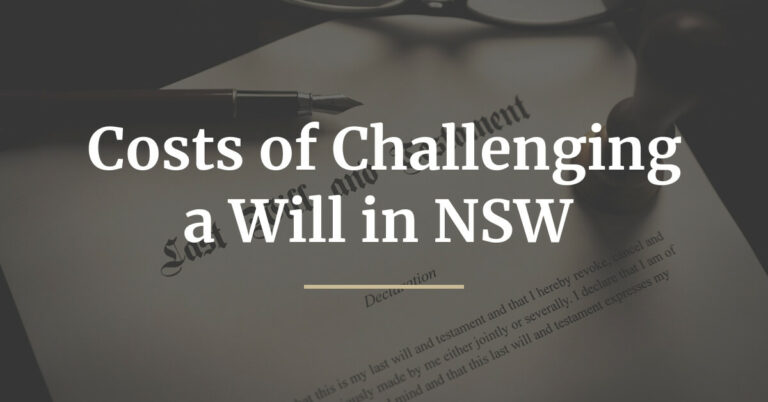
Costs of Challenging a Will in NSW
To challenge a will means to take issue with execution of the will, the will-maker’s cognitive health (referred to as ‘testamentary capacity’) at the time they made the will, or the circumstances surrounding the preparation of the will (i.e., suspicious circumstances, undue influence, fraud). In NSW, the cost of challenging a will depends on several

Can a Grandchild Contest a Will
Can Grandchildren of The Deceased Contest a Will in NSW? In NSW, only an ‘eligible person’ can contest a will. The grandchild of a deceased person may be considered an ‘eligible person’ if they satisfy a court of the following: They were, at any particular time, wholly or partly dependent on the deceased person; and

How to Challenge a Will in NSW
To challenge a will means to take issue with the validity of the will. There are many grounds on which a person may challenge the validity of a will. Questions may arise in relation to the execution of the will itself or in relation to the circumstances surrounding the drafting or preparation of the will

Can a Child of the Deceased Contest a Will in NSW?
A child may be disinherited for many reasons. It may occur where the child is independently wealthy, where the child is estranged from the parent, or where a child has been ‘passed over’ in favour of a grandchild. Regardless of the reasons, any child who receives less than what they were expecting or nothing at
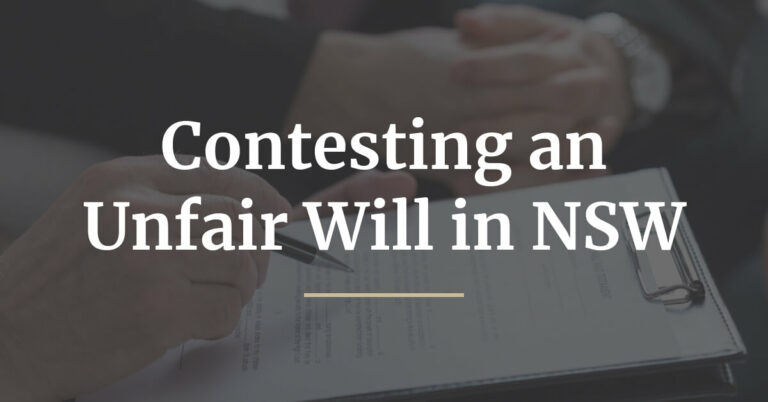
Contesting an Unfair Will in NSW
A person who receives less than they were expecting in a will or nothing at all may feel as though the will is unfair. In NSW, they may be able to contest the will by bringing a ‘family provision claim’. Although family provision claims are not determined on fairness, a feeling of unfairness may indicate

What is a Family Provision Claim in NSW?
A person in NSW is free to leave their estate to anyone they choose. This is referred to as “testamentary freedom.” This testamentary freedom is subject to the Court’s power to alter the terms of a deceased person’s will when a will is successfully contested through a family provision claim. An eligible person may bring

Can a Spouse of the Deceased Contest a Will?
Contesting a will is a legal process whereby a person who believes they have been unfairly left out of a will, or has not received as large a share as they were expecting may bring a claim against the deceased’s estate. In NSW, contesting a will involves bringing a ‘family provision claim’ under the Succession

Can a Separated Spouse Contest a Will in NSW
Recently, we wrote a blog about whether a spouse can contest a will in NSW. But what about those who are divorced or separated? Can a former spouse contest a will after the divorce? With up to 30% of marriages ending in divorce, getting legal advice on how to update your will post-divorce, or make
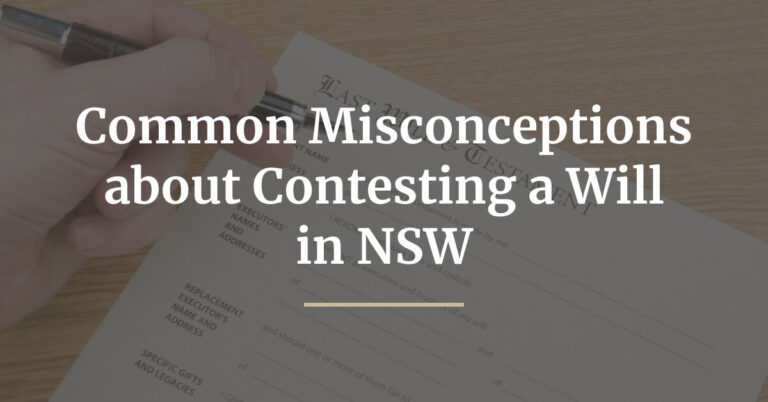
Common Misconceptions about Contesting a Will in NSW
Contesting a will is a complex legal process that should only ever be undertaken with the advice of a specialist will dispute lawyer. There are a range of common myths about contesting a will that can lead to misunderstandings, delays, and potential legal problems. Remember, if you are considering contesting a will, you must make
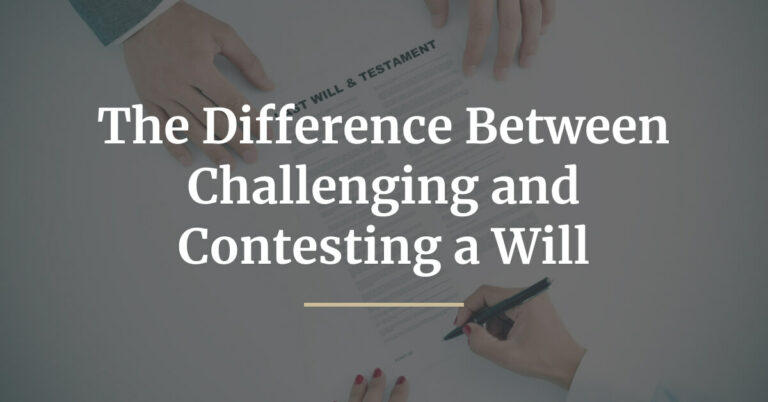
The Difference Between Challenging and Contesting a Will
Do you have a question or concern about your claim within a will, or a suspicion that a will was not prepared fairly? Notably, such issues fall into two distinct areas of will dispute law: challenging a will, and contesting a will. The differences between challenging a will and contesting a will under NSW law
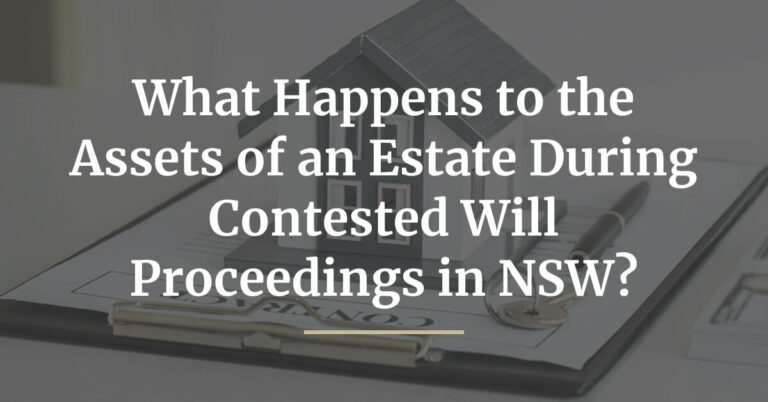
What Happens to the Assets of an Estate During Contested Will Proceedings in NSW?
While a will is being contested, the assets of an estate will usually be held and controlled by the executor until the will dispute has been resolved. For this reason, a person considering bringing a family provision claim via a will contest should put the executor on formal notice of their claim as soon as
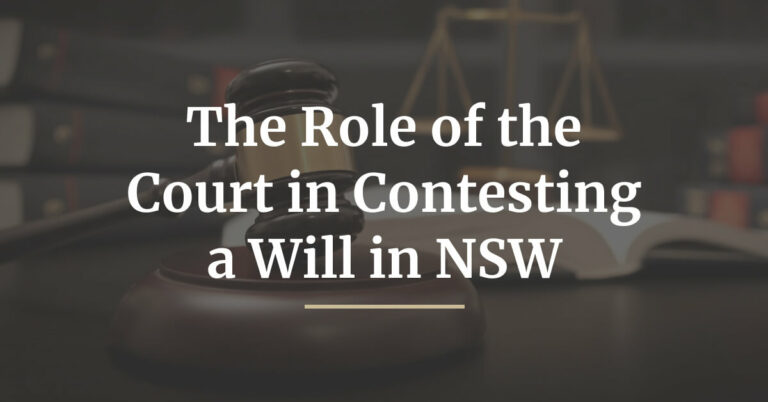
The Role of the Court in Contesting a Will in NSW
Courts play an integral role when contesting a will. Although many wills disputes involving a contested will can be resolved through negotiations and/or mediation, sometimes the matter isn’t resolved in this phase, and it moves on to a court proceeding. Speaking with an experienced wills and estates lawyer is the first step in helping you
